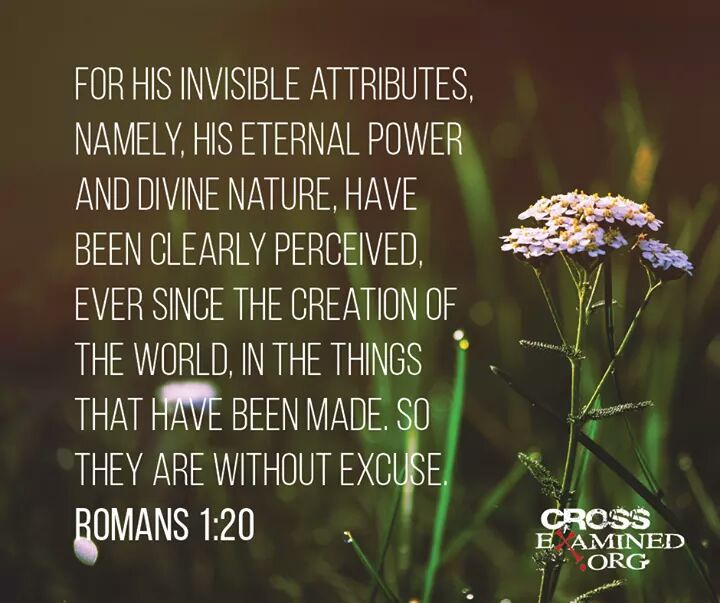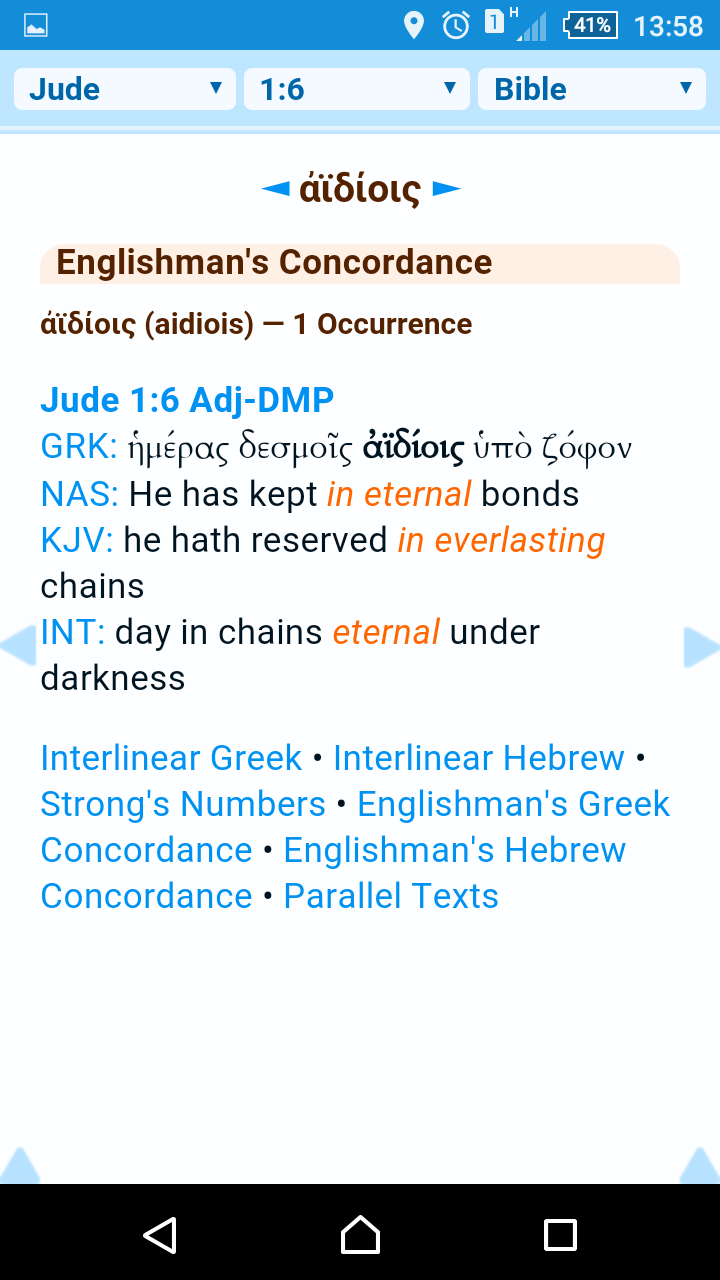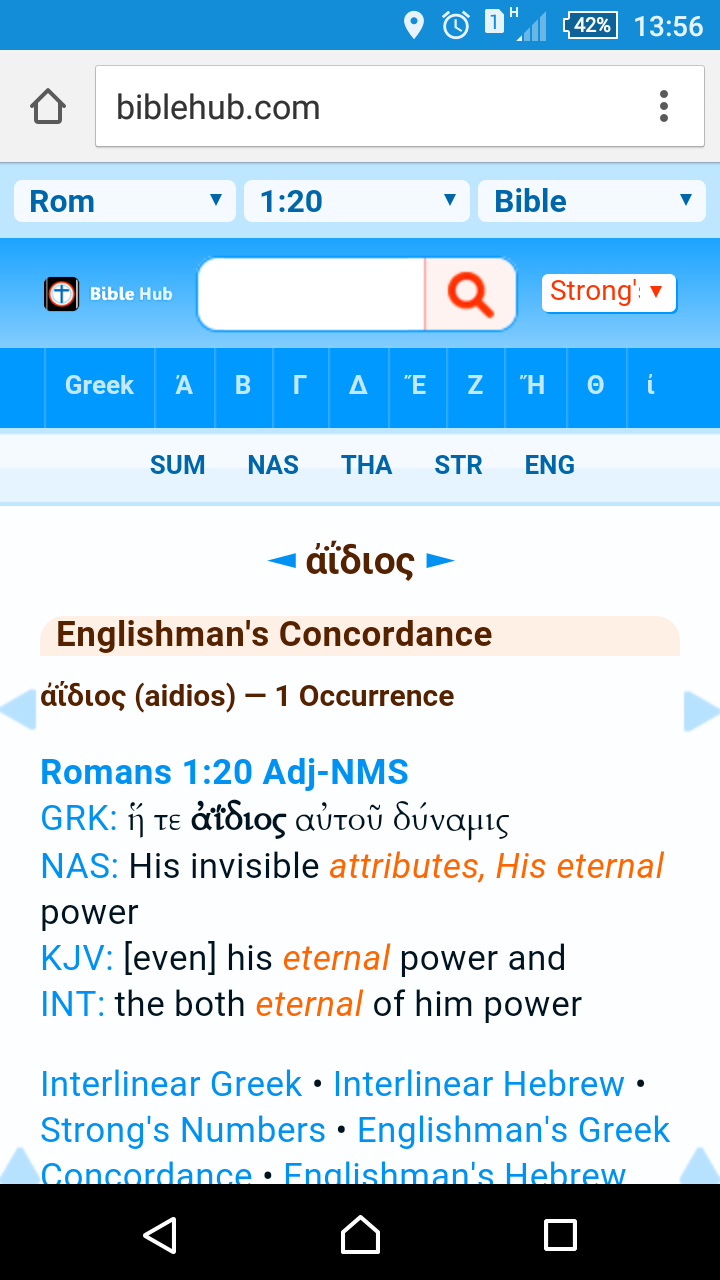It is Eternal
The Greek word used here is in Romans 1:20 is “eternal” (Aidios) beautifully describing God’s Eternal Power. The only other occurrence (please see images) from the same root word is found in Jude 1:6 (or Jude 6). Nowhere else in the Bible does it ever occur again.
“And the angels who did not keep their first estate but left their own habitation, he has reserved in eternal chains under darkness unto the judgment of the great day.” (Jude 1:6)
Now, here is the interesting part:
(i) Apostle Paul who wrote the verse in Romans never used “Aidios” when “referring to the duration of punishment by God”. Neither did any other authors of the Bible.
(ii) The verse is Jude does “not” refer to the “duration” of “punishment” but to the “chains” which are “eternal” (meaning they cannot be broken; powerful bonds of eternal strength that not even angels can break free from it).
(iii) For the Punishment of angels, we know from the book of Revelation that its “duration” is to the “ages of Ages” (not Aidios/aidiois). This is because no one’s duration of punishment can exceed that of Satan’s as it is written:
“and the Devil, who is leading them astray, was cast into the lake of fire and brimstone, where are the beast and the false prophet, and they shall be tormented day and night — to the ages of the ages.” (Revelation 20:10)
(iv) So,
Either, God in His Greatest Mercy must have “reduced the sentence from aidiois (if the everlasting chains implied everlasting punishment, Jude 1:6)” to “ages of Ages” (actual sentencing verse, Revelation 20:10)
Or,
The “Everlasting chains” must mean “unbreakable strength” which God intended to use ‘to hold them in darkness’ till that “Great Day” (‘which is coming’).
Or
Some Greek scholars exist who insist that even Aidios/Aidiois may not mean ‘philospohical eternity’ but a “longer & stronger” duration which is limited too. When saying this, a shallow argument often ensues as follows:
‘Does that mean that God’s Power is not eternal?’
A Classic response:
‘God’s Power is Eternal without any definition being needed. The verse is not defining the duration of God’s Power (not the topic here) but rather that He created the ‘current state’ to last to the “age/ages” (which is often highlighted) as He restores all creation again.’
Just like the phrase ‘God of Abraham’ does “not” imply that He is the God of Abraham only. That phrase ‘highlights’ His God-ship over faithful Abraham just like the phrase age/ages (“not” Aidios/aidiois but Aionion/Aionion etc.) highlights the time-periods to which His Purposes of reward & punishment are fulfilled.
(v) Either way (whether Aidios/Aidiois means eternal or not), since it’s “never” used to describe the “actual sentencing” or “duration” of “punishment” of men/angels in the Bible, we should not be Careless either to do otherwise.
(vi) The word Aidios/Aidiois has never been used in the context of “men” (“punishment” or otherwise) in the Bible. So, it’s best to keep “eternal away” from anything to do with men less we become Careless in our doctrines affirming things that are never written nor meant like that in His Most Holy Word (the Bible).
(vii) The Bible is accurate to the very last dot/jot or word used & we must take it as it’s written (“no” adding nor removing but exactly as it is).
“Blessed Saviour of the World”
**Personally, I believe that the word Aidios/aidiois means eternal.





